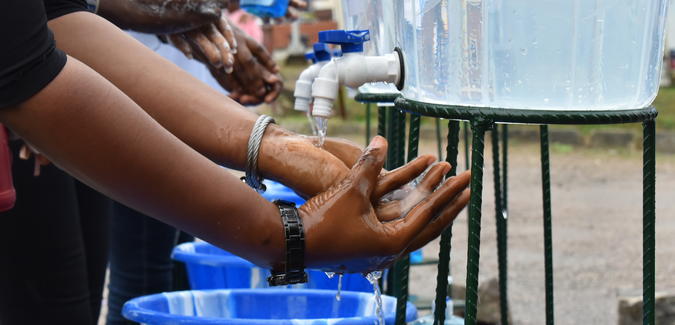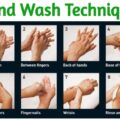Hand washing (or hand hygiene) is the single most important method of preventing the spread of infection in the hospital, at home, and in the community. Experts agree that regular and proper hand washing using soap and water is the simplest and most effective way to promote personal hygiene and reduce infections at school and in most workplaces. The water temperature doesn’t matter. It’s the length of time you spend scrubbing and rinsing off appropriately that are important. If you’re in a situation where hand-washing isn’t possible, use a hand sanitizer with an alcohol content of 60% to 95%. Just be aware it’s not quite as effective as soap and water. You can keep hand sanitizers in places like your car, book bag, or desk. But because they’re alcohol-based, you should store them out of the reach of children. Kids should only use them with adult supervision.
According to the 2018 WASH National Outcome Routine Mapping Survey findings by Nigeria’s Federal Ministry of Water Resources, only 11 percent of the entire population has access to basic Water, Sanitation, and Hygiene services.
Types of Hand Washing
Routine, or social
This type of hand washing involves the use of soap and water. People perform this type to remove visible dirt, after using the toilet, before preparing food, and at other times. It usually lasts a few seconds.
Antiseptic
This type of hand washing uses water and antimicrobial soap. It removes or destroys microbes on the skin. Medical professionals may use this method before touching a high-risk patient, or after contact with a person with an infection.
Surgical
Medical professionals perform this hand washing, involving water and antiseptic soap, before all surgical procedures. It lasts for at least 2 minutes. SEE: How to Make Liquid Hand Wash at Home and Commercially
10 Importance Of Hand Washing In Nigeria
- Prevent transmissions of diseases from animate and inanimate sources
Hand washing minimizes the spread of pathogens between people, or between other living things and people. Fomites or inanimate objects and surfaces, such as contaminated computer keyboards, desk tops, stair rails, and cutlery often provide surfaces that harbor microorganisms that are easily transferred to membranes of the mouth, nose, and eyes via the hands.
- Prevents epidemics and pandemics
Handwashing is a primary means of stopping the spread of germs and preventing routine infectious diseases such as Ebola, COVID-19, influenza, and common colds. Shaking hands, a common greeting in several nations, can transmit germs from person to person.
- Hand washing helps battle the rise in antibiotic resistance
Preventing sickness reduces the number of antibiotics people use and the likelihood that antibiotic resistance will develop. Handwashing can prevent about 30% of diarrhea-related sicknesses and about 20% of respiratory infections (e.g., colds). Antibiotics often are prescribed unnecessarily for these health issues. Reducing the number of these infections by washing hands frequently helps prevent the overuse of antibiotics—the single most important factor leading to antibiotic resistance around the world. Handwashing can also prevent people from getting sick with germs that are already resistant to antibiotics and that can be difficult to treat.
- Prevents hospital-related infections
The nature of many kinds of medical procedures is very delicate. It usually deals with exposed internal organs or passing drugs into the body. So in these particular cases, hand washing has to be taken seriously because harmful bacteria can easily get into our bodies to cause more harm. Good medical facilities have the basic facilities for hand washing easily accessible. These facilities should be used regularly by doctors, patients, and visitors. Additionally, those facilities need to be absolutely sanitary and the soap dispensers, sanitizers, and other items need to be replenished regularly. Also, special waste disposal units need to be in the washroom, as well. The efforts for creating a safer working environment also include a more thorough and more detailed hand scrubbing than is expected from other employees. There is a certain way medical personal prepares for the surgeries and interventions and it requires a lot of high-quality soap.
- Prevention of diarrhea and uncomfortable intestinal diseases
The bacteria eventually gets on your mobile phones, clothes, door knobs, and into your body. There are troubling statistics that indicate a large percentage of credit cards and mobile phones have tested positive for traces of faecal waste on them. Contact with faecal matter laden with the causative bacteria can lead to diarrhea and intestinal illnesses. Regular washing of the hands will remove this faecal matter and bacteria from our hands even when we have contacted them from other people or objects. If this contamination happens over and over again, it is possible that your employees develop chronic issues with intestinal bacteria. The new bacteria that a person introduces to their intestinal system through dirty hands destroy the balance which is difficult to restore. This is called SIBO – Small Intestinal Bacterial Overgrowth. SEE: How Often Should I Deworm My Child
- Provides cover for people with weak immune systems
A study conducted by the Harvard Medical School gives the expression ‘dirty money’ and entirely new twist. Namely, it showed that 94% of the dollar bills currently in circulation also tested positive for having traces of faecal waste on them. For a healthy person with strong immunity, these facts are not a cause for much worry. Unfortunately, not everybody has a strong immune system. Regular hand washing can prevent individuals with low immunity from falling sick, especially children who are just building up their immune systems and the more susceptible elderly citizens; not to mention those who are managing diseases like HIV and Hepatitis. These people have weakened immune systems and are always at risk of contracting harmful bacteria if they live in dirty environments.
- Reduction of the bacteria content on your hands
Bacteria have been known to linger on the hands and other objects for days! This means that if you do not wash your hands expecting the bacteria to die, you might be in for a surprise. They will stay on your hands, or even worse – make their way to your eyes or mouth, causing infections. Don’t forget to pay extra care to wash underneath your nails. Those that are prone to nail-biting may suffer from many unpleasant consequences. Bacteria have been known to thrive on paper bills for as long as two entire weeks. This is scary, but regular hand washing can keep you protected.
- Hand washing saves cost
According to studies, hand washing is one of the most cost-effective investments in public health. Disability-adjusted life years (DALY) help measure the effectiveness of health interventions by combining information about years of life lost and years lived with a disability. Hand washing significantly reduces the huge resources and income that would otherwise be used for the treatment of diseases related to poor hand hygiene.
- Hand Washing Saves Lives
According to the World Health Organization, Clean hands remain one of the most powerful ways to prevent health care-associated infections, save lives and transform the quality of health care at all levels. Diarrhea kills 2,195 children every day, COVID-19 has killed over a million people in less than one year. The organisms that transmit these diseases from person to person can be eliminated by frequent washing of hands and observing the needed protocols.
#10. Hand washing keeps people healthy
Eighty percent of common infections are spread by hands. Washing your hands at least five times a day has been shown to significantly decrease the frequency of colds, influenza (the “flu”), and other infections. Not only will it help keep you healthy, but it will also help prevent the spread of infectious diseases to others. Hand sanitizers can also be used to reduce the bacteria when there is no soap or water. The use of hand sanitizers will not give the same protection as an actual hand washing but you will end up with fewer bacteria on your hands. A cleaner hand will often lead to a healthier life. ALSO READ: The 4 Main Importance of Sanitation






